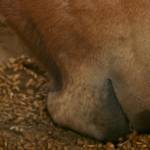Blood Chemistry of Mules Studied

Mules—the offspring of female horses and male donkeys—have characteristics of both parents, but are not identical to either horses or donkeys. Compared to the body of knowledge related to the health and well-being of horses, little is known about blood chemistry, body temperature, and other basic health parameters of mules. This lack of specific information makes it difficult to provide the best routine as well as emergency health care for the long-eared hybrids.
Amy McLean, an equine specialist at North Carolina State University, has researched some of the differences in blood work values between horses and mules. Using healthy mules and horses owned by the United States Forest Service, McLean’s team found that many blood count values were quite similar. However, mules had lower white blood cell, lymphocyte, and monocyte counts than horses. These cells function to prevent infection. On the other hand, the mean corpuscular volume, a measure of red blood cell concentration and total red blood cells, was higher in mules than in horses.
McLean is conducting a larger study that will compare baseline blood chemistry of donkeys and hinnies (offspring of male horses and female donkeys) as well as mules and horses. Results of these studies may be useful in providing better management and health care for all types of equines.








